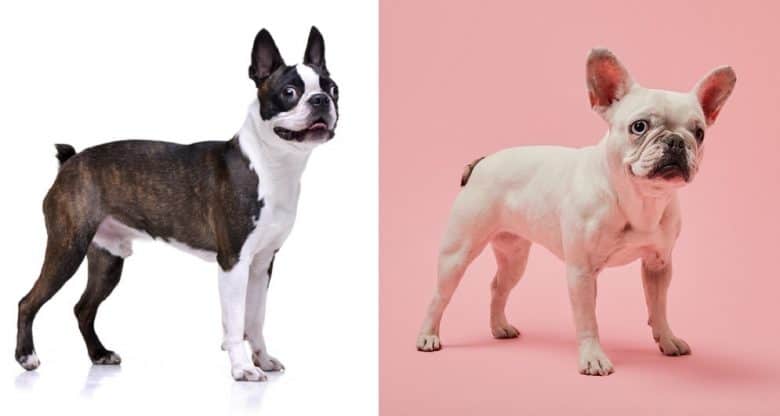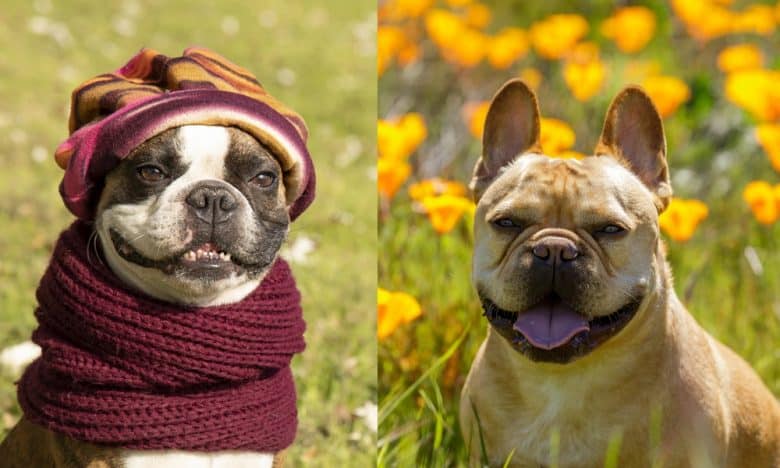Last Updated on February 13, 2022
Short, stocky, and adorably cute, the French Bulldog and Boston Terrier are two dog breeds that are often mixed up.
These pint-sized companions have fearless attitudes but hearts of gold, making them some of the most sought-after dog breeds around.

But how exactly do they differ, and which is the best breed for your home? Keep reading as we unpack the pros and cons of these different breeds.
Quick Navigation
- 1 Breed Comparison: A Quick Breed Facts
- 2 The History of Boston Terriers and French Bulldogs
- 3 Boston Terrier vs. French Bulldog Appearance and Breed Features
- 4 Boston Terrier vs. French Bulldog: Temperament and Personality Traits
- 5 Boston Terrier vs French Bulldog: Differences in Care Requirements
- 6 Boston Terriers vs. French Bulldogs Health, Wellness, and Lifespan
- 7 Are Boston Terriers More Expensive than French Bulldogs?
- 8 Frequently Asked Questions (FAQs):
- 9 Boston Terrier or French Bulldog: Which One Should You Get?
- 10 Further reading: Popular pooches compared
Breed Comparison: A Quick Breed Facts
While they make look similar, some key differences set the Boston Terrier and French Bulldog breeds apart. The two have quite different histories and even some subtle differences in personality and looks.
Here’s a nifty table to give you a quick comparison between these two breeds:
| French Bulldog | Boston Terrier | |
| Height | 11-12 inches tall | 15-17 inches tall |
| Weight | 16-28 pounds | 12-25 pounds |
| Temperament | Playful, stubborn, and independent | Playful, affectionate, and sociable |
| Energy | Low energy | High energy |
| Lifespan | 10-14 years | 11-13 years |
| Price | $1,500 and up | $1,000 and up |
| Coat Colors | A wide variety of colors | Black, brindle or seal and white |
The History of Boston Terriers and French Bulldogs
Although both dogs have a similar Bulldog ancestry, their histories are quite different. Boston Terriers were created when White English Terriers were mixed with English Bulldogs.

The father of the modern Boston Terrier is a dog named Hooper’s Judge, who was owned by Robert C. Hooper of Boston, Massachusetts.
The dog was likely imported from England, where these dogs originally went by the name of Round Heads, Bullet Heads, or Bull Terriers.
Crossbreeding between the French Bulldog, the English Bull Terrier, the Boxer, and the Pit Bull Terrier eventually gave rise to what we know today as the Boston Terrier.
The Boston Terrier was the first non-sporting breed to be recognized in the United States.
French Bulldogs owe their lineage to Toy Bulldogs. English lacemakers took these dogs over to Normandy in France during the industrial revolution, where they were popular rat catchers.
These dogs were then crossed with small breeds like Pugs and French Terriers to create the Bouledogue Francais.
Americans created the first French Bulldog club at the end of the 19th century and began to breed French Bulldogs for their bat ears, a classic trait that is now the breed’s hallmark.
Today, both French Bulldogs and Boston Terriers are members of the Utility breed group, which also includes Poodles, Dalmations, and Schnauzers. The UK Kennel Club recognized French Bulldogs in 1905 and Boston Terriers in 1914.
Boston Terrier vs. French Bulldog Appearance and Breed Features
Boston Terriers and French Bulldogs are similar in size and shape with muscular, stocky little bodies and short muzzles.

They both boast short, little tails and oversized upright ears. The tail is occasionally corkscrewed; however, this is a malformation in the vertebra. This trait is more common in French Bulldogs.
There are, however, some noticeable physical differences that help to tell them apart.
The first way is via their coat color. Boston Terriers are known to be always wearing a tuxedo, thanks to their black and white coat. The Boston coat can also be brindle or seal colored, which is a dark brown.
French Bulldogs, however, come in many more color variants, including brindle, brindle and white, fawn brindle, fawn, cream, white, and white and fawn.
Boston Terriers are also slightly leaner than their French Bulldog counterparts with longer legs. They also have a square head with virtually no wrinkles, whereas the French Bulldog has many wrinkles on the face.
Of course, the French Bulldog also stands apart because of its bat-like ears.
Want to see what a French Bulldog and a Boston Terrier look like side by side? Check out this adorable video of a Boston called Oreo and a Frenchy named Luka:
Boston Terrier vs. French Bulldog: Temperament and Personality Traits
Both these breeds are part of the non-sporting group and are bred to be companions, not working dogs.
That said, the personalities of Boston Terriers and French Bulldogs are pretty different and so will likely be the deciding factor in determining which dog is right for your home.

Are Bosties and Frenchies good family dogs?
Both of these breeds are very intelligent and quick to bond with their people, forming unbreakable ties. If you’re looking for a new best friend, then these breeds will not disappoint.
Boston Terriers have the nickname American Gentleman and will get along with most members of your family, even the kids, and the cat.
French Bulldogs, however, don’t hand out their affection with such aplomb, much like the Parisians. These feisty dogs don’t do well with cats and other dogs and often don’t take a shine to small children.
French Bulldogs are, however, known to the class clowns and will provide hours of amusement with their cheeky personalities. They are also very affectionate and love a good cuddle with their humans.
Boston Terriers are pretty energetic little dogs and love to join their families on adventures; however, French Bulldogs prefer couch potato life.
Boston Terrier vs French Bulldog: Protection
Although small in size, neither of these dog breeds is a yapper. Boston Terriers bark a bit more than French Bulldogs, but they’re unlikely to annoy your neighbors too much.
Boston Terriers can also be a touch territorial, so they are good watchdogs. That said, early socialization is key with both breeds to prevent any problematic behaviors.
Boston Terriers vs. French Bulldogs city living
Both Bostons and Frenchies are prone to separation anxiety. French Bulldogs, in particular, are pretty clingy and won’t do well if left at home alone all day while you go off to work.
That said, both these dogs can adapt well to life in an apartment, provided they are taken for a daily walk.
French Bulldogs often do better indoors where the temperature is controlled as they tend to overheat. These dogs also can’t swim, so any pool or pond in your yard would need to be fenced in.
If you’re going to keep these breeds in a tight space, you’ll also want a heads up that they can be loud snorers and more than a little gassy.
Which breed is easier to train?
Both of these dog breeds can be super stubborn, making them a challenge to train.
Due to the Boston Terrier’s eagerness to please nature, he can be slightly easier to train than the French Bulldog and is better suited to first-time dog owners.
Positive reinforcement and consistency is the key when dog training these breeds. As food motivated breeds, they will love a treat and some praise.
Punishment or harsh treatment will destroy the personalities of these sensitive pups. Negative treatment can also cause them to become even more stubborn and even aggressive.
Boston Terriers can sometimes be quite territorial, so it’s important to socialize these dogs from a young age.
Boston Terrier vs French Bulldog: Differences in Care Requirements
Both Boston Terriers and French Bulldogs have low maintenance needs and are pretty adaptable little dogs.
That said, the short snout of the French Bulldog can cause them to get hot quickly, so they shouldn’t be left out in the sun or an area that gets too hot.

Boston Terrier vs French Bulldog exercise
Boston Terriers have higher activity levels than French Bulldogs. They need between 30 and 45 minutes of exercise each day compared to Frenchies who only need between 15 and 30 minutes.
Along with physical activity, Bosties will also enjoy mental puzzle games that keep the mind active. Boston Terriers can do really well at dog sports and agility challenges.
Because they are brachycephalic dogs, Frenchies are prone to overheating quickly and should not be exercised excessively.
Grooming needs of a French Bulldog vs Boston Terrier
Both these dog breeds have short coats and low grooming needs. Boston Terriers hardly shed while French Bulldogs shed a mild to moderate amount.
A weekly brushing will help remove any loose fur and assist in spreading the skin’s natural oils.
Wash your dog only when he gets dirty, and not more than once a month, as excessive bathing can dry out the skin and cause itchiness.
As both of these breeds can present with tear stains, particularly if they have light coats, their faces can be wiped down daily.
In addition, you may also need to clean between the folds of the French Bulldog’s wrinkles to prevent sores and infections.
Feeding your Bostie or Frenchie
As small dogs, both these breeds don’t eat an awful lot, requiring only about a cup of kibble each day. That said, both these dogs are pretty greedy and tend to overeat if given a chance, so be sure to monitor their treats.
A low-calorie kibble can also help control your dog’s weight and try not to offer them any table scraps no matter how cute they look when they beg.
If you have a Boston Terrier, then you need to be warned that they can unleash some epic farts. To avoid this, opt for a dry dog food that contains plenty of fiber and is fortified with probiotics and yucca extract.
Boston Terriers vs. French Bulldogs Health, Wellness, and Lifespan

Unfortunately, both of these dog breeds have a pretty long list of health problems. As they are both flat-faced brachycephalic breeds, they are plagued by many of the same health concerns.
Both breeds are prone to developing breathing problems, such as a collapsing trachea.
Also, spinal issues frequently occur in these breeds, such as intervertebral disk disease (IDD) and hemivertebrae, which is the failure to properly develop the spine’s bones.
Other common ailments include patellar luxation and heatstroke. Due to their prominent, bulging eyes, eye problems such as cataracts, corneal ulcers, and glaucoma are also common.
In addition, Boston Terriers are known to develop deafness in one or both ears, and sometimes this breed develops seizures.
On the other hand, French Bulldogs tend to get skin allergies. As previously mentioned, both breeds are also susceptible to obesity, especially if they are overfed and not exercised.
French Bulldogs have an average life expectancy of between 10 and 12 years, while Boston Terriers typically live slightly longer, between 11 and 13 years.
Are Boston Terriers More Expensive than French Bulldogs?
When looking for a puppy of either breed, ensure that you carefully research the breeder.
Reputable breeders will be able to supply you with patella evaluations, ophthalmologist evaluations, hip evaluations, the results of cardiac exams on the parent dogs.

Due to the popularity of both breeds, there are some disreputable breeders and puppy mills out there.
Be wary of backyard breeders whose puppies are likely to have numerous health and behavioral problems.
A reputable breeder will always let you visit the parent dogs and puppies on-site and have all the necessary health clearances
Puppies of Boston Terriers typically go for around $700 to $2,700, averaging about $1,000.
On the other hand, French Bulldogs are a bit more expensive, with prices ranging from $1,500 and up. Some French Bulldog puppies have even been known to fetch $8,000.
You would be fortunate to find one of these breeds in a dog shelter. However, there are breed-specific rescues that sometimes advertise dogs looking for new homes.
Adopting one of these older dogs will typically set you back between $100 and $400.
Frequently Asked Questions (FAQs):

Which is more popular, the Boston Terrier or the French Bulldog?
French Bulldogs are the more popular dog breed, ranked 4th by the American Kennel Club (AKC), while the Boston Terrier comes in 21st.
Several French Bulldogs are also popular in the media, with many even having their very own Instagram accounts or appearing in films and TV shows.
Do French Bulldogs and Boston Terriers get along?
If well socialized, French Bulldogs and Boston Terriers can get along, although the Boston Terrier is more than likely going to be the one who wants to be friends, while the French Bulldog may take longer to warm up.
Both breeds may struggle to get along with members of the same sex.
If you really can’t decide between these two breeds of dog, you could always go for a Frenchton, a crossbreed mix of a Boston Terrier, and a French Bulldog.
Boston Terrier or French Bulldog: Which One Should You Get?

Both adorable dogs, either the Boston Terrier or French Bulldog may be suitable for your family.
While both breeds have similar looks, health issues, and maintenance needs, they have different personalities.
The Boston Terrier is the more friendly and energetic of the two. On the other hand, the French Bulldog is more reserved and better suited to a more sedentary lifestyle.
Whichever one you choose, we are sure you’ll love your new family member.
Do you already have a Boston Terrier or French Bulldog at home? We’d love to know all about your furry friend in the comments below.
Further reading: Popular pooches compared
- Golden Retrievers vs Labradors
- English Labradors vs American Labradors
- Rottweiler vs Pitbull
- Belgian Malinois vs. German Shepherd
- Labradoodle vs Goldendoodle
Cess is the Head of Content Writing at K9 Web and a passionate dog care expert with over 5 years of experience in the Pet Industry. With a background in animal science, dog training, and behavior consulting, her hands-on experience and extensive knowledge make her a trusted source for dog owners.
When not writing or leading the K9 Web content team, Cess can be found volunteering at local shelters and participating in dog-related events.
